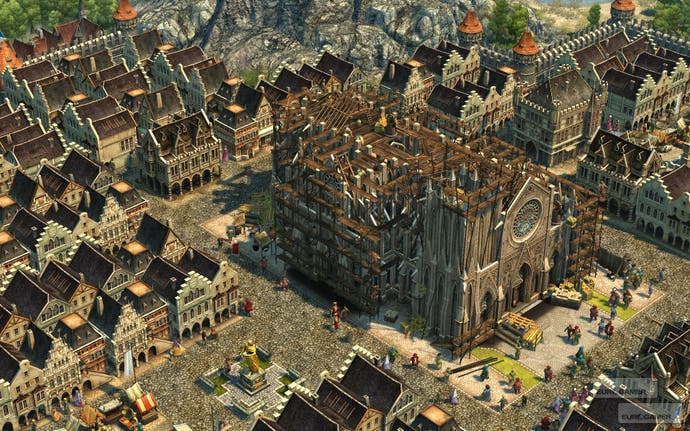Anno 1404
Trading places.
Once you've got a harbour and dock, you can add to your initially available flagship with a flock of trade and military vessels, populate other islands and trade or battle with other factions. All trade routes can be automated, too, with waypoints and loading/unloading schedules set up with an easy and precise interface on the map screen. This takes a lot of the graft out economic management, whilst maintaining a pleasantly observable front-of-curtain trade mechanism, letting you watch your caravel pootle between islands, laden with spices and cloths, without worrying too much about exactly what they're doing.
This sense of being totally in control without having to concern yourself overly with the minutiae of day-to-day management is one of Anno's real strengths - once things are set up, they generally continue to work pretty well without supervision. Handy alerts will pop up to let you know when a warehouse is full or a well has dried up, but on the whole the game's pacing allows you to focus your attentions on what you're actually trying to achieve, without all the plate-spinning of many similar titles.
Control also feels pleasantly direct. There's an immediacy with which your actions are carried out - actions you can observe - that removes a great deal of the obscurification and behind-the-scenes spreadsheet manipulation that usually pervade resource-management. Goods must be physically shipped to islands if they're to be used there, meaning that trading vessels and the military vessels that protect them, soon become vitally important. Without regular trade, settlements will struggle to flourish and your coffers will rapidly deplete.
Sadly, when it does come to naval confrontation, and indeed combat in general, 1404 rather lets itself down. It's clear that this isn't a game about warfare, even though the campaign storyline revolves around just that, and this is reflected in the relative shallowness of the system. Ships pull alongside and pound each other with broadsides, troops march off and swarm over enemy installations or units, but it's really just a matter of numbers and hit-points, with no room for tactics. It seems slightly trite to complain that winning is simply a matter of building things in the right places when assessing a game like Anno, but it's hard to see what a more accomplished combat system would have taken away from the game.

There are occasional problems with quest info and resolution too, with objectives not always being clear, although not usually to any serious degree. Once or twice I was left a little perplexed as to how I should proceed, but generally the mission structure flows excellently, ferried along by a number of superbly voiced and well-fleshed-out characters. The main campaign is all the more engaging for this, the storyline unfolding conveniently alongside the gradually increasing complexity of the tech trees. It's also massive, and is ably supported by a number of relatively free-form standalone challenges with varying difficulty levels. As with nearly all strategy games, there's also a huge replay value here, with different approaches applicable to many situations, even if objectives essentially remain the same.
Anno's pastoral, languid style will undoubtedly frustrate some, and those seeking breakneck excitement or a complex military framework would do well to look elsewhere, but if a gentle and rewarding management sim with a hint of tropical sunshine is what you're after, then you won't go far wrong with this. Just keep a bowl of cool water handy to rest your feet in.
